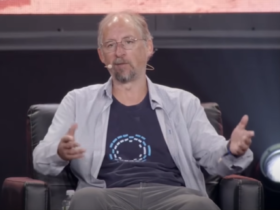The Financial Freedom Policy Coalition, an organization founded by Venezuelan activist Jorge Jraissati, has received a grant in bitcoin (BTC) as part of the latest round of funding from the Bitcoin Development Fund, an initiative of the Human Rights Foundation ( HRF). In the last few hours, the information was released on social networks.
The movement brings together youth leaders, legislators, and cryptoasset experts with the goal of promoting economic opportunities for those living under dictatorial regimes. Its main mission is to educate people about how bitcoin can strengthen human rights and generate social benefits.
These funds are part of the 7 BTC—more than USD 690,000 at the time of writing this article—that the Human Rights Foundation (HRF) has allocated to 20 projects around the world. The initiatives are focused on provide technical training to people living in dictatorships, strengthen independent media, decentralize bitcoin mining and offer more private financial solutions to human rights organizations. The grants are focused on countries and regions in Latin America, Asia and Africa.
Jorge Jraissati, leader of the Financial Freedom Policy Coalition and president of the Economic Inclusion Group, is dedicated to design programs that promote financial inclusion at a global level. His work lies in the convergence between foreign policy, economics and finance, with a special focus on the impact of financial regulations on human rights and democracy.
In recent years, Jraissati has published numerous articles in which he denounces how, In authoritarian regimes, regulations can be used as tools of repression against activists and young leaders.
Although the Human Rights Foundation (HRF) did not specify the amount allocated to each project, the list of the 20 personalities and initiatives that will receive part of the 7 BTC in this round of subsidies was disclosed. Some of them are the following:
- Vexl: Founded by Lea Petrasova, it is a bitcoin trading application that allows direct transactions between users without the need for intermediaries or complying with KYC (know your customer). Its focus on privacy is essential for people living under authoritarian regimes, allowing them to maintain their financial freedom and protect their privacy in a repressive environment.
- Unify: Created by Owen Vaughan, it is a Payjoin wallet – a privacy enhancement for bitcoin transactions – that strengthens the privacy of bitcoin transactions by allowing multiple parties to collaborate on a payment without leaving a clear history.
- Krux – is open source software that turns common devices into hardware wallets for secure bitcoin transactions.
- No BS Bitcoin: This news service provides information about bitcoin and open source technologies in an accessible way, without ads, tracking or paywalls.
Bitcoin plays an essential role for those living under authoritarian regimes, by offer a secure and decentralized solution to safeguard privacy and financial autonomy. Initiatives like these give citizens the possibility of making transactions anonymously, accessing uncensored information and protecting their assets, without having to depend on financial systems controlled by governments.
The case of Venezuela is framed in this context. In fact, according to a Chainalysis report, the country has seen more than 110% year-on-year growth in cryptocurrency transactions. This increase has been driven primarily by the devaluation of the bolivar and the need to find financial stability amid political upheaval.






Leave a Reply